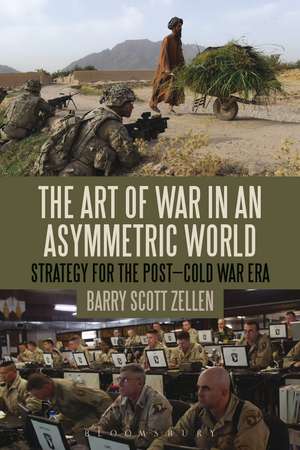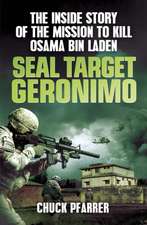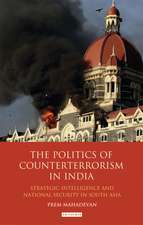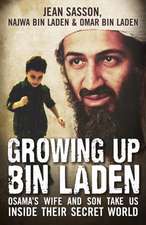The Art of War in an Asymmetric World: Strategy for the Post-Cold War Era
Autor Dr. Barry Scott Zellenen Limba Engleză Paperback – 12 mar 2014
| Toate formatele și edițiile | Preț | Express |
|---|---|---|
| Paperback (1) | 259.90 lei 6-8 săpt. | |
| Bloomsbury Publishing – 12 mar 2014 | 259.90 lei 6-8 săpt. | |
| Hardback (1) | 952.83 lei 6-8 săpt. | |
| Bloomsbury Publishing – 29 aug 2012 | 952.83 lei 6-8 săpt. |
Preț: 259.90 lei
Preț vechi: 296.64 lei
-12% Nou
Puncte Express: 390
Preț estimativ în valută:
49.73€ • 52.03$ • 41.31£
49.73€ • 52.03$ • 41.31£
Carte tipărită la comandă
Livrare economică 03-17 aprilie
Preluare comenzi: 021 569.72.76
Specificații
ISBN-13: 9781628920888
ISBN-10: 1628920882
Pagini: 352
Dimensiuni: 152 x 229 x 19 mm
Greutate: 0.48 kg
Editura: Bloomsbury Publishing
Colecția Bloomsbury Academic
Locul publicării:New York, United States
ISBN-10: 1628920882
Pagini: 352
Dimensiuni: 152 x 229 x 19 mm
Greutate: 0.48 kg
Editura: Bloomsbury Publishing
Colecția Bloomsbury Academic
Locul publicării:New York, United States
Caracteristici
Connects anti-technology and anti-modernization movements, from the Zapatista Rebellion to the Unabomber and Al-Qaeda
Notă biografică
Barry Scott Zellen is a senior research scholar at the Naval Postgraduate School in Monterey, USA, where he is Director of the Project on Climate and Conflict and Editor-in-Chief of The Culture and Conflict Review and The Climate and Conflict Review journals. He has published several books, including State of Doom: Bernard Brodie, the Bomb, and the Birth of the Bipolar World (2011).
Cuprins
Foreword by David A. Anderson, U.S. Army Command and General Staff College1. Global Disorder: The Post-Cold War Era: The Bipolar Collapse and the Rise of Global Entropy 2. Asymmetrical Conflict and the Information Age: From Globalization to Global Rebellion3. The Global War on Terror: Restoring Order in the Post-9/11 World 4. The Art of War in an Asymmetric World 5. The Tribal Foundations of Order: Restoring Order, One Tribe at a Time
Recenzii
Zellen has once again created a masterpiece. With a unique and penetrating view of the world and human behavior, Zellen has penned another stirring analysis of our modern condition. You don't have to agree with him, but you cannot ignore him.
Barry Zellen has assembled a comprehensive work that is a must for the bookshelves of security theoreticians, practitioners, students, and teachers. Wonderfully written and always thought-provoking, this book serves as a beacon in an ever-changing world.
The Art of War in an Asymmetric World is a much needed work synthesizing modern thinking about war and refreshing it for the 21st century. It offers an interdisciplinary look into the human dimensions of war and the impacts of technology, globalization, and increased complexity. Moving beyond the sound bites of strategic thinking, it is a profound pondering about war, strategy, and sources of conflict. Much like Michael Handel's 1992 classic, Masters of War: Classic Strategic Thought, Zellen's new book is bound to stir debate among America's strategic thinkers.
Barry Zellen has provided a book that stretches the boundaries of our thinking on the nature of global disorder following the collapse of the bipolar world in the 1990s. As noted by Zellen, the world is today riven by a variety of clashes surrounding different aspects of modernity, globalization, disenfranchised populations, human rights, religion, and ethnicity. This work points out that war and conflict in today's world need to be understood in the context of systemic global complexity and are not attributable to a single factor. All students and scholars of strategy and conflict in the current era should take note of Zellen's important and lasting contribution to our understanding of war in the modern world.
In his fascinating new book, The Art of War in an Asymmetric World, Barry Scott Zellen breaks new theoretical ground, exploring both the theorists of disorder who emerged after the Cold War's end, and the strategists of order who responded to this new, chaotic world. While much of our world has globalized, Zellen reminds us that in the remote regions where today's wars are being waged, the world remains inherently tribal. Zellen provocatively argues only tribal order-- and not state-imposed centralized orders-- can provide us with a stable, and enduring structure of world politics, and a foundation for the return of peace. One need not share Zellen's enthusiastic embrace of tribalism to both understand and appreciate that his book initiates a much-needed debate on tribalism in the modern world.
Barry Scott Zellen's The Art of War in an Asymmetric World breaks new ground weaving together the intimate (but usually neglected) interconnections between tribal conflict and the fight against terrorism, which has been unfolding now for over a decade in some of the most remote and therefore, largely indigenous frontier regions in the world. Had our war planners read this pioneering work before entangling us in Afghanistan, we'd very likely not be in the tragic situation that we are today. This important work needs to be closely read-- particularly Zellen's concluding chapter on 'The Tribal Foundations of Order'-- at the highest levels of command now facing intractable Transnational Organized Crime, both here in the Americas and across the seas.
Barry Zellen has assembled a comprehensive work that is a must for the bookshelves of security theoreticians, practitioners, students, and teachers. Wonderfully written and always thought-provoking, this book serves as a beacon in an ever-changing world.
The Art of War in an Asymmetric World is a much needed work synthesizing modern thinking about war and refreshing it for the 21st century. It offers an interdisciplinary look into the human dimensions of war and the impacts of technology, globalization, and increased complexity. Moving beyond the sound bites of strategic thinking, it is a profound pondering about war, strategy, and sources of conflict. Much like Michael Handel's 1992 classic, Masters of War: Classic Strategic Thought, Zellen's new book is bound to stir debate among America's strategic thinkers.
Barry Zellen has provided a book that stretches the boundaries of our thinking on the nature of global disorder following the collapse of the bipolar world in the 1990s. As noted by Zellen, the world is today riven by a variety of clashes surrounding different aspects of modernity, globalization, disenfranchised populations, human rights, religion, and ethnicity. This work points out that war and conflict in today's world need to be understood in the context of systemic global complexity and are not attributable to a single factor. All students and scholars of strategy and conflict in the current era should take note of Zellen's important and lasting contribution to our understanding of war in the modern world.
In his fascinating new book, The Art of War in an Asymmetric World, Barry Scott Zellen breaks new theoretical ground, exploring both the theorists of disorder who emerged after the Cold War's end, and the strategists of order who responded to this new, chaotic world. While much of our world has globalized, Zellen reminds us that in the remote regions where today's wars are being waged, the world remains inherently tribal. Zellen provocatively argues only tribal order-- and not state-imposed centralized orders-- can provide us with a stable, and enduring structure of world politics, and a foundation for the return of peace. One need not share Zellen's enthusiastic embrace of tribalism to both understand and appreciate that his book initiates a much-needed debate on tribalism in the modern world.
Barry Scott Zellen's The Art of War in an Asymmetric World breaks new ground weaving together the intimate (but usually neglected) interconnections between tribal conflict and the fight against terrorism, which has been unfolding now for over a decade in some of the most remote and therefore, largely indigenous frontier regions in the world. Had our war planners read this pioneering work before entangling us in Afghanistan, we'd very likely not be in the tragic situation that we are today. This important work needs to be closely read-- particularly Zellen's concluding chapter on 'The Tribal Foundations of Order'-- at the highest levels of command now facing intractable Transnational Organized Crime, both here in the Americas and across the seas.
Descriere
This book examines the post Cold War security environment and how the U.S. has learned to wage war in this complex assymetrical world of conflict.















